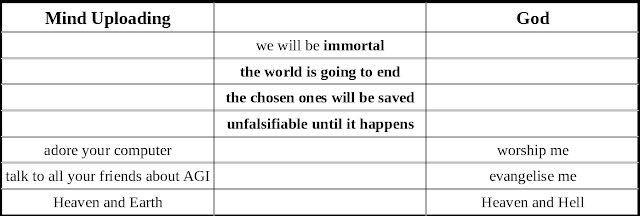Is this some kind of a religion?
There are several parallels between religious beliefs and the Mind Uploading Movement.
Is Mind Uploading just a religion for nerds?
I took some lines out of an interview with Naval Ravikant, who gives a beautiful rebuttal of the Mind Uploading Movement.
"It’s very hard to tell apart from a biblical kind of story. I find the people who are pushing it the most are what I would call sort of armchair technologists. They might understand a little bit of science, but these are not the PhDs and physicists who are pushing this. It’s not like the Fields Medal winning mathematicians who is pushing this. I was trained in a little bit of science and I consider myself an amateur scientist. I know just enough to know how little we know."
Ladies and Gentlemen, yours truly is a perfect example of an armchair technologist. Am I going to give up the 'Mind Uploading Religion' as I am gaining more understanding of it?
"Physics still can’t solve the three-body problem. Collide 3 billard balls together, can’t tell you what happens. We cannot properly model complex systems. We can’t tell the weather next week. We still can’t solve the vast majority of chronic diseases. We’re just starting to connect the gut and the brain and bacteria in our system together. There is so much complexity in nature and humans have just begun to scratch the surface. To believe that we are going to sort of go into this world of perfection through technology I think is far-fetched."
I am not too comfortable with this argument. I don't think we need to understand complex systems in order to emulate intelligence. I believe intelligence is just a bundle of faculties, a set of abilities. Artificial General Intelligence will be a system that will be very good at combining these abilities.
"Let’s talk about AI. Everyone is talking about AI. None of these people have written real code. We are no closer to creating a general AI, I think, than we were 20 years ago. There are actual huge advances that have been made in specific AI, but these are data processing problems. Basically if I dump huge amounts of real world images into a neural network, then I can do better image recognition, no question. That is real. That is a data-driven solution. The algorithms haven’t gotten any better. The structure of how the human brain works and how the human body works is still so far advanced beyond our machine capabilities that, certainly, if there’s going to be a singularity, it’s not going to happen in my lifetime.
There you go, a tech guru telling you that it ain't happening anytime soon!:)
"I think in that sense some things like the singularity are pernicious. They’re pernicious for the same reason that the afterlife is pernicious. It takes you out of the moment. It gives you hope for the future so you stop living for today and you start living for tomorrow. I know that doesn’t sound like much, but it’s actually a big deal. At any given time, when you’re walking down the streets, a very small percentage of your brain is focused on the present. The rest is future planning or regretting the past. That’s keeping you from an incredible experience. It’s keeping you from seeing the beauty in everything and for being grateful for where you are.I think it can literally destroy your happiness if you spend all your time living in delusions of the future."
Here, the philosopher-meditator is takes the stage. And goes overboard. He then course-corrects, to say that not all the time pursuing dreams is wasted:
"I do think the singularity thing is good in the sense that it pushes forward technological advancement. We put more resources on it. We spend more time developing some of the great things as a human race, some of the great technologies, that we can take advantage of. In that sense, anything that pushes science forward is a good thing. I think it’s delusional to think that you’re somehow going to be saved before you die by some combination of AI and magic science. You just have to live the life you have."

Comments
Post a Comment